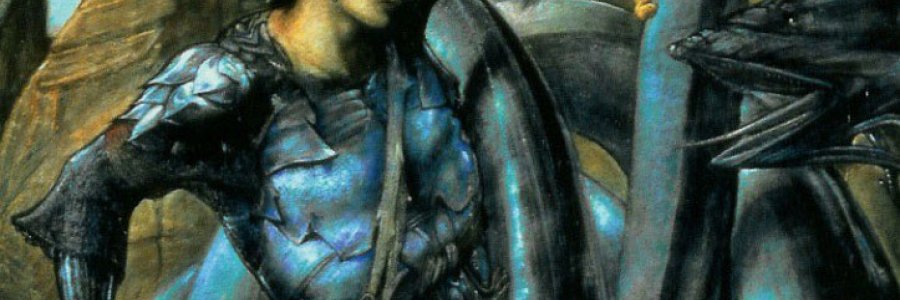In the first few pages of E. R. Eddison’s The Worm Ouroboros, we see a man named Lessingham carried on the back of a hippogriff. He is led by a magical black martlet to a world called Mercury—a world that resembles the Viking Age of Earth. Lessingham is to be an observer of the story to come, just as we are.
Eddison begins by introducing us to the demons of Demonland and the witches of Witchland—factions much at odds. These strange, alien characters resemble us in many ways, but they are not us. They adhere not to our morals but to a pure warrior ethic of honor and glory. They are a raw force of nature personified.
A gorgeous style of writing
Long, tortuous sentences wind artfully around a profoundly mythic narrative. It takes a little time to get my mind acclimated to the unusual, beautiful arrangements of words and metaphors.
It takes some more time to become accustomed to the switching of language styles as we alternate between descriptive prose, dialogue, written letters, and songs.
This bit of dialogue stands out as an example:
“I like not the dirty face of the Ambassador,” said Lord Zigg. “His nose sitteth flat on the face of him as it were a dab of clay, and I can see pat up his nostrils a summer day’s journey into his head. If’s upper lip bespeak him not a rare spouter of rank fustian, perdition catch me. Were it a finger’s breadth longer, a might tuck it into his collar to keep his chin warm of a winter’s night.”
This sort of artfully constructed language makes me want to take my time, enjoying each phrase. I find myself highlighting passages along the way, not for their meaning but for their beauty:
So rowed they till day broke, and a light wind sprang up fresh and keen. Juss waked, and stood up to scan the gray glassy surface of the sea spread to vast distances where sky and water faded into one. Astern, great clouds bridged the gates of day, boiling upwards into crags of wine-dark vapour and burning plumes of sunrise. In the stainless spaces of the sky above these sailed the horned moon, frail and wan as a white foam-flower blown from the waves. Westward, facing the thunder-smoke of dawn, the fine far ridge of Kartadza was like cut crystal against the sky: the first island sentinel of many-mountained Demonland, his topmost cliffs dawn-illumined with pale gold and amethyst while yet the lesser heights lay obscure, lapped in the folds of night. And with the opening day the mists swathing the mountain’s skirts were lifted up in billowy masses that grew and shrank and grew again, made restless by the wayward winds which morning waked in the hollow mountain side, and torn by them into wisps and streamers.
Between those spells of ornate dialogue and imagery, there is high adventure and action to keep my lizard brain excited. The pages turn well into the night.
A child’s imagination and an experienced writer’s craft
E. R. Eddison wrote this book at 40 but based it on stories he imagined at the age of 10 (around 1892). Many of the names and conceits written by the 10-year-old Eddison never changed. Many of his critics, including Tolkien, have criticized this. For me, part of the fun was the strange blend of an older writer’s elaborate myth and craft with a young writer’s playfulness and imagination.
An unapologetic glorification of aristocracy and violence
This is a world I would never wish for. War, in The Worm Ouroboros, is not a horrific nightmare, nor even is it a cruel necessity. Instead, Eddison treats war as the instrument of grand deeds and adventure. When the heroes are not fighting or preparing for battle, they are heavy with yearning for it. Without violence, the book seems to say, men become empty vessels, unmoored and lost. A man can ask to achieve no greater than to leave a trail of bodies before ending in a bloody death at the hands of his enemies.
To make matters worse, not all men appear capable of grand deeds and heroic character. Great heroism, the book implies, is reserved for the highborn. Never have I read such an unapologetic paean to the aristocracy. While the Lords and Kings send men to die by the tens of thousands—men treated as mere pieces on a game board—all characters treat the death of a single of those Lords with deep reverence and honor. Even when an enemy combatant dies in a moment of cowardice and betrayal—so long as he is of a noble class—his death is met with effusive posthumous praise and somber grief. Forget the many thousands who threw themselves at swords in hopeless battles for no reason other than to protect their Lords’ honor.
At one point, a critical piece of the narrative is told from the perspective of a common soldier. One might think this is the time to offer at least a moment of tribute to the sacrifices of these soldiers. Instead, the soldier relays his utter admiration for the Lords, whose strength, heroics, and brilliance are unparalleled. This soldier treats even himself as a cog in the machinery, expendable so long as the Lords breathe and battle.
Fascinating, nonetheless
Though I would not wish for this world, it does fascinate me to study it for a while: a world where dangerous demigods walk and rule, concerned only with their own need for glory and affirmation in blood and battle. As such, no other book has so vividly transported me into its alien settings and cultures. The unwavering honor of the demons is infectious and likable as the Lords of Demonland set aside every defensive impulse in the monomaniacal pursuit of a lost brother. The love and devotion between brothers are endearing. The witches are fun, balancing the occasional bravery and heroics with internecine bickering, martial wit, and the occasional dark magics.
The Worm Ouroboros affected me in some profound and ineffable way. Its violence was glorified without apology, and the aristocracy was shamelessly romanticized, but the writing was beautiful, and the underlying goodness and honor of the demons of Demonland were strangely inspiring. The world of Mercury still haunts my mind some time later.

